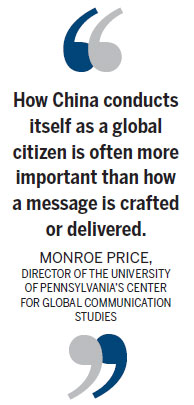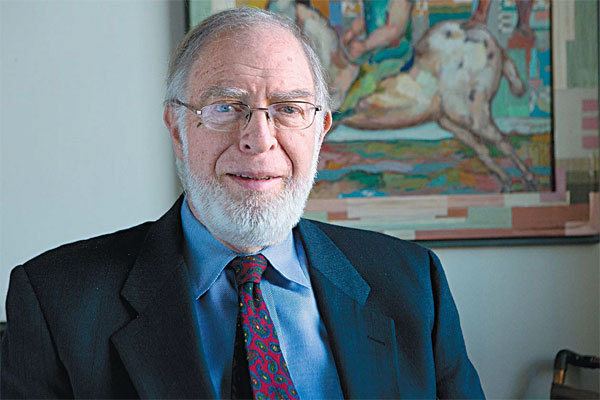China's new audience
Updated: 2015-02-20 08:51
By Wang Chao(China Daily Europe)
|
|||||||||||
Nation must expand from traditional methods of communicating and shape the chatter on the Internet
Monroe Price, director of the University of Pennsylvania's Center for Global Communication Studies, says China must smartly leverage the power of the Internet in shaping opinions worldwide instead of worrying over building its global image.
Born to Jewish parents in Vienna in 1938, Price immigrated with his family to the United States in 1939. In addition to his directorship at UPenn, he is currently an adviser at Oxford University's Programme in Comparative Media Law and Policy and various other institutes.
|
Monroe Price says China's economic achievements and ambitious exchange programs are manifestations of the nation's soft power. Provided to China Daily |
He says China is not completely confident with how it is building a positive global image, an issue that has been exacerbated by Chinese experts and think tanks openly questioning the way the nation is presenting itself to the world. Price says he believes China is underestimating its communicative capacity.
"How China conducts itself as a global citizen is often more important than how a message is crafted or delivered," he says. "China conveys its message to the world through the thousands of students who come from Chinese universities and study abroad; through the quality of its entrepreneurship and the nature of its great new global enterprises; through how it deals with the challenges of pluralism, individualism, creativity and the fostering of ideas; and by the ways in which it takes leadership and responsibility in global crises."
In 2008, Price co-edited a book titled Owning the Olympics: Narratives of the New China about how China wove narratives of the nation into the global psyche through the lens of the Beijing Olympics.
"I wonder how or whether critical reassessments of the experience led to an understanding of how the Olympics furthered or failed to further particular visions of China in the global imagination. What were the lessons learned? Could they apply to other major initiatives?"
What is certain is that China needs more than a few years to build its image, Price says.
"Think of France and the long arc of the French Revolution, or the United Kingdom and its commitment to a parliamentary system of government. What are the images of France or the UK and what long-term efforts have influenced those images? So it's often more than 'power', but the global significance of institutions."
As a point of comparison, Price says it's interesting to look at the various approaches that Germany, Austria and Italy used to redefine themselves after World War II.
"Germany moved from a divided post-war country to reigning European power, and it expended enormous energy in terms of reassessing its past. It created and sought to fulfill its own postwar and post-Berlin Wall image of itself."
Similarly, the UK has carved out a post-colonial vision of its role in the world through the British Council and the BBC World Service, among other methods.
What's important for China is how it handles huge shifts either domestically or globally because people all over the world are watching the nation's every step, he says.

"People wish to know how China's growth and development affects the economy, human rights, large scale conceptions of sovereignty and multilateralism. Because of this attention, the capacity for meaningful impact on image-building is riveting."
Price says he thinks China's economic achievements and ambitious exchange programs are manifestations of the nation's soft power. The Annenberg School for Communication at UPenn, for example, has benefited from an exchange in which the China Scholarship Council sends the nation's top graduate students to the institute.
Through the nation's state media outlets, however, the message of the "China Dream" is not reaching audiences in the West.
"Conveying the dream requires a format and approach very different from conveying news or current events. I'm not sure what that model is," he says.
Various global players, such as Russia and France, are experimenting with different media approaches to present a positive image.
"In a way it is an experimental period: experiments with rethinking the structure of persuasion, what constitutes a good job, and whether and in what circumstances states can help shape the global information agenda."
Price says he thinks Chinese newspapers and TV and radio stations are doing better in some markets than others, though with the rise of individual media outlets - Facebook and Twitter in the West and Weibo and WeChat in China - the traditional meaning of "audience" has changed.
Worldwide, the Internet is becoming an increasingly important arena for major economies. This leads to what Price calls "the foreign policies of Internet policies", or the jockeying among countries to influence the global debate over management of the Internet.
Raising the example of the World Internet Conference in China in November, Price says the series of meetings at the summit, such as the World Summit on the Information Society, are efforts to gather opinion leaders, influence the direction of debate and bring additional perspectives to bear.
"Obviously China and the United States are leaders in trying to guide and shape such policies. There are also modes of building coalitions for various global positions. The World Internet Conference represents a strong effort by China to assert its role as convener and opinion leader in this area.
"I am sure that other leaders, including Europe, the United States, Brazil and others will study how the World Internet Conference, as a new entry in this process, affects future debate.
"The United States actively considers how best to refine its official position and how to explain and articulate that position globally. The World Internet Conference is an episode in this long story. Both the US and China will study how these events affect the strategies of so-called 'swing states', those who are still shaping the way they will present themselves in international forums."
In his new book, Free Expression, Globalism and the New Strategic Communication, recently published by Cambridge University Press, Price tries to chart major transformations in the distribution of persuasive ideas. In the book, he says there are new "strategic architectures" for the distribution of images and words.
"The old world of public diplomacy and the old world of propaganda are changing because of the vital and vigorous entry of individual media," he says. "Aggregated individual media transforms interpersonal communication and creates new modes for one to communicate to many."
But the intense pace, vitality and reach of a networked individual media provides a new paradigm, he adds.
Nevertheless, powerful shapers of opinion - states, corporations, interest groups and NGOs - will have to adjust to this phenomenon, he says.
"They will do so by changing the methods and techniques for reaching audiences and indeed, the very meaning of 'audience' will change."
Bio
Monroe E Price
Director, Center for Global Communication Studies, Annenberg School for Communication, University of Pennsylvania
Age: 77
Education and clerkships
1960, Yale University, Bachelor of Arts
1964, Yale Law School (cum laude), Juris Doctor
1964-1965, Law clerk for Associate Justice Potter Stewart, United States Supreme Court
1965-1966, assistant to W. Willard Wirtz, US secretary of labor
2000-2001, member. Institute for Advanced Study, Princeton, New Jersey,
2000, lecturer, (seminar in media globalization). Yale Law School
1999, visiting professor. Cornell Law School
1996-1998, communications Fellow. John and Mary Markle Foundation
1970-1990s, special Adviser. Cook Inlet Region Inc, Alaska Native Corporation
Current, director, Center for Global Communication Studies, Annenberg School for Communication, University of Pennsylvania
Current, director, Stanhope Center for Communications Policy Research, LSE, London
Current, senior research associate, Programme in Comparative Media Law and Policy, Oxford University
Books:
Free Expression, Globalism and the New Strategic Communication, Cambridge University Press, 2014
wangchao@chinadaily.com.cn
(China Daily European Weekly 02/20/2015 page32)
Today's Top News
Austria on alert following Denmark terror attacks
Rouble's fall to hurt weather forecast: Meteorological center
S Korea top choice for Chinese holidaymakers
UN Security Council slams IS murders of 21 Egyptians
Danish police kill gunman suspected of shootings
Michele Ferrero, maker of Nutella, dies on Valentine's Day
Italy closes Libyan embassy
8th Europe-Ukraine Forum held
Hot Topics
Lunar probe , China growth forecasts, Emission rules get tougher, China seen through 'colored lens', International board,
Editor's Picks

|

|

|

|

|

|






